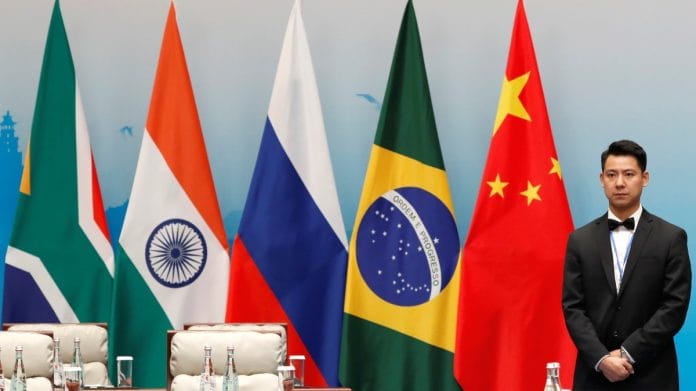New Delhi: Palestine is currently in talks with foreign ministries of India, Russia, China, and South Africa in its efforts to join BRICS, which is increasingly being viewed as a counter to multilateral groups led by the West, say diplomatic sources.
India’s decision would be key in this regard, analysts said, as New Delhi has continued its balancing act over the Israel-Hamas war, without taking an “anti-Israel” stand either.
Palestine will be able to submit an application to become a member after the October summit in Russia, during the next presidency of the grouping in 2025 held by Brazil, say sources.
The upcoming BRICS Summit will take place in Russia’s Kazan from 22-24 October. Earlier in August, during a visit to Moscow, Palestine President Mahmoud Abbas said he and Russian President Vladimir Putin had reached a “verbal agreement” for Palestine to attend the upcoming summit in an “outreach format”.
Currently in New York to attend the 78th session of the UN General Assembly, Abbas is expected to be seated on the floor of the General Assembly among other member states for the first time.
Also read: MEA slams Iran’s Khamenei’s remarks on Indian Muslims’ ‘suffering’ as ‘misinformed’, ‘unacceptable’
Why the India vote is crucial for Palestine
Formed in 2009, BRICS is a consensus-based body and any decisions require unanimous agreements. Last year, for the first time in 13 years, the bloc expanded by adding four new members into its fold — a move that analysts saw as an attempt to reshuffle the world order. At the Johannesburg summit, the bloc detailed criteria for BRICS membership, which includes being a member state of the UN.
Palestine is currently a non-member observer state at the UN. However, in May, the UN General Assembly voted in favour of a draft resolution that said Palestine was qualified and should be admitted as a full member of the UN. It also recommended that the Security Council “reconsider” the matter “favourably”. India was one of 143 votes that backed Palestine’s bid to join the international organisation.
Experts say Palestine’s entry in the future could be decided by India.
Khinvraj Jangid, Associate Professor & Director of Jindal Center for Israel Studies, explained that unlike other major BRICS players such as Brazil, Russia and China, New Delhi hasn’t adopted an “anti-Israel stand”.
“Brazil, Russia and China have taken quite anti-Israel stands. That leaves only India with a balanced perspective on this question. India doesn’t have to prove to anyone its solidarity for the Palestinians. Though, I suppose India will look after the Israeli reservations on it,” Jangid told ThePrint.
According to Jangid, however, it’s not safe to assume that the group’s new entrants such as Saudi Arabia, Egypt and Iran would apply any “coordinated pressure” for Palestine’s entry.
Kabir Taneja, Fellow at Observer Research Foundation (ORF), told ThePrint, “BRICS has an overwhelming majority looking favourably to the Palestinian cause, with South Africa having even taken Israel to the ICJ (International Court of Justice). India’s balanced support for Israel is in minority within BRICS at this time.”
On Sunday, days after India abstained from a UN resolution to end Israel’s occupation of Palestine, Prime Minister Narendra Modi and Palestine’s President met on the sidelines of the UNGA. Modi expressed “deep concern” over the humanitarian crisis unfolding in Gaza and reaffirmed India’s “unwavering support” to the people of Palestine.
Met President Mahmoud Abbas in New York. Reiterated India’s support for early restoration of peace and stability in the region. Exchanged views of further strengthening long standing friendship with the people of Palestine. pic.twitter.com/LnmAm7dDax
— Narendra Modi (@narendramodi) September 23, 2024
‘Palestine could make BRICS moral alternative to G7’
Joining BRICS would be a “political” move for Palestine, diplomatic sources said, as it continues to vie for wider international recognition amid the Israel-Hamas conflict.
Israeli journalist and political commentator Lev Aran argued that Palestine’s entry into BRICS would make the group all the more distinct from the G7.
“Palestine is being encouraged to apply for BRICS membership not on the strength of its economic, cultural or scientific merits, but rather because its inclusion would cast the organisation as a sort of moral alternative to the affluent G7 club,” he told ThePrint.
This year has also seen some European countries change their stance on the long-standing Israel-Palestine issue. In May, Spain, Ireland and Norway formally recognised the Palestinian state, arguing the country could help secure a ceasefire in Gaza and the release of Hamas-held hostages. Israel accused the countries of “rewarding terror”.







BRICS & NAM have issued some of the strongest statements against Israel, since the war began & India is a signatory to both